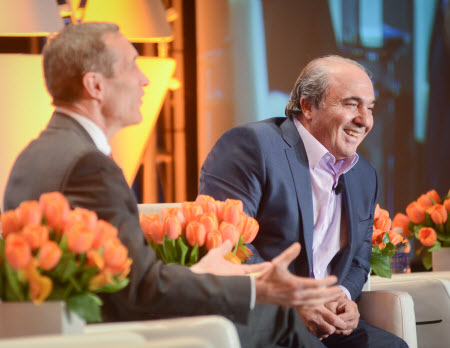Standing Up for Small Cable’s Interests
The smarter way to stay on top of the multichannel video marketplace. Sign up below.
You are now subscribed
Your newsletter sign-up was successful

RELATED:Mediacom: 20 Years of Growth | Rocco Commisso: From Calabria to a Cable Chairmanship | Mediacom: What They’re Saying | Viewpoint: Timing Was Right for Rocco
Despite its size, Mediacom Communications has picked some pretty hefty battles in the past 20 years, taking the lead on what still are hot-button issues in the cable industry — rising sports programming costs and retransmission consent — as well as more recent issues like the Title II reclassification of broadband and the unbundling of the set-top box business.
Mediacom made its biggest splash in 2003, when the eighth-largest cable operator in the country took on ESPN, petitioning the Federal Communications Commission for permission to place the sports network on a separate tier. Mediacom’s move was to offset what was then ESPN’s regular 20% annual rate increase, a boost that chairman and CEO Rocco Commisso said was a direct result of the network’s overpayment for sports rights.
Mediacom didn’t win that fight — the FCC didn’t rule on the sports-tiering issue, and Mediacom’s later carriage deal with the network didn’t pare down the increases. But it did set the stage for a later fight between ESPN and Cox Communications CEO Jim Robbins.
Robbins accused The Walt Disney Co.’s ESPN of “goofy economics” and threatened to drop the network. The battle, which lasted for almost a year, ended when Cox signed a 10- year agreement for ESPN, with an average rate increase of 7% annually.
The 7% increase became an industry benchmark and Commisso was one of the few cable CEOs who publicly supported Robbins and Cox through the battle.
But the ESPN battle was just the beginning. Commisso and Mediacom took up the retransmission-consent gauntlet early, asking the FCC to halt programming blackouts during negotiations with TV stations and to curb rate increases. The cable operator also has been involved in some high-profile disputes — most notably its three-month standoff with Sinclair Broadcast Group stations in Iowa, Mediacom’s largest cluster of markets, in 2007.
The smarter way to stay on top of the multichannel video marketplace. Sign up below.
Other fights followed with LIN Broadcasting in 2011, Granite in 2015 and Media General in 2015.
Mediacom was one of the founding members of the American Television Alliance (ATVA), a group of distributors targeting retrans reform. The company has also been active in the FCC’s most recent retransmission- consent moves, asking the agency to condition broadcast license renewals on certification that a station will not black out its signal during a retrans dispute if the station is not accessible to 90% of its market either over-the-air or on the Web.
“He has definitely been willing to be the face of some pretty controversial issues, more than any other,” MoffettNathanson principal and senior analyst Craig Moffett said of Commisso. “He has championed the small cable operator and the intrinsic disadvantage they face in retrans disputes and programming negotiations.”
More recently, Mediacom has taken up the Title II mantle, with Commisso publicly calling out President Obama during his visit to Iowa last year. The president, who has championed the FCC’s Title II reclassification of broadband, had visited Cedar Falls (Iowa) Municipal Communications Utility, a Mediacom competitor, in the run-up to his 2015 State of the Union Address.
Interviewed by C-SPAN on the day of the Title II vote, Commisso challenged Obama’s choice to visit a monopoly — the municipal broadband provider was also the water, gas and electric utility — to talk about how Mediacom was a monopoly, and called Title II a “monstrous regulatory scheme.”
“How fair is it for the president to pick and choose what side he wants to appease to?” Commisso told C-SPAN that day, adding that his employees were upset they didn’t even get a mention when the president came to Cedar Falls to talk about the importance of broadband.
Mediacom has come out publicly against the FCC’s plan to unbundle the set-top box market — a move Mediacom said will stifle investment in the broadband network. And the company has also criticized the government’s treatment of Google, subsidizing its Google Fiber buildouts in several municipalities. In one instance, Huntsville Utilities, the city of Huntsville, Ala.’s own municipal utility, is building a $60 million fiber network that it plans to lease back to the Internet service provider.
Commisso and Mediacom believe it is strange that the richest Internet company in the world needs help in terms of municipal tax dollars, while cable operators, which have created jobs and built networks out of their own pockets in their communities, get nothing.
Moffett said Commisso has never been afraid to take a principled stand and has spoken out against what he believes are policies that are discouraging investment in infrastructure and the business. And his words have more weight because they are backed up with decades of action.
“He can speak to those issues with a level of moral authority that his peers can’t because he is a true entrepreneur,” Moffett said. “He’s been willing to put his money where his mouth is.
“He’s invested, and when he talks about what it takes to create jobs, he talks about it from the perspective of someone who has actually created jobs,” Moffett said.
